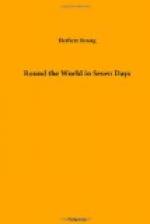Unhappily, though the wind had dropped, the sky became blacker than ever, and another deluge of rain fell, so densely that at a distance of a few yards it seemed to be an opaque wall. Coming to the conclusion that he had better take shelter until he could at least see his way, he planed downwards, calling to Rodier to keep a sharp look-out for a landing place. Suddenly, in the midst of the downpour, a huge dark shape loomed up ahead, appearing to rise almost perpendicularly above the plain. For a few seconds it seemed to Smith that he was dashing into a solid wall of rock. Luckily he had checked the speed of the engine. He now stopped it altogether, but the aeroplane glided on by its impetus, and he felt, with a sinking of the heart, that nothing could save it.
All at once the mass in front seemed to open. Instinctively Smith touched his steering lever; the aeroplane glided into the fissure; in two or three seconds there was a bump and a jolt; it had come to a stop, and was resting on an apparently solid bottom.
Monsieur Alphonse Marie de Montause, a distinguished member of the Academy of Inscriptions, a pillar of the Societe d’Histoire diplomatique, and a foreign member of the Royal Society, had been for nearly a year engaged at Nimrud in the work nearest to his heart, the work of excavation. It was a labour of love for which he was very jealous. He believed it was his mission to reveal to an astonished world the long-buried secrets of ancient civilizations; he could not bear a rival near the throne of archaeological eminence; and in this exclusive attitude of mind he had undertaken this expedition without the companionship of a fellow-countryman, or even of any white man, devoting himself to his patient and laborious toil, assisted only by an Egyptian cook, a number of Arab labourers, and such natives of Babylonia as he had attracted to his service by the promise, faithfully kept, of good and regular pay.
His excavations had been, on the whole, disappointing. He had unearthed specimens of pottery and metal-work, tradesmen’s tablets of accounts, seals, bas-reliefs, differing little from those which could be found in many a European museum; but he had not for many months lighted upon any unique object, such as would open a new page in the history of archaeological research, and make Europe ring with his name.
His money was nearly all expended; his permit from the Ottoman Government was on the point of expiring; he was sadly contemplating the necessity of leaving this barren field and returning to France; he had, indeed, already despatched a portion of his caravan to begin its long journey to the coast, remaining with a few men to finish the excavation of the tell—the mound covering the remains of a Babylonish city—on which he was engaged, in the hope of discovering something of value, even at the eleventh hour. He had almost completed it, and he could easily hurry after the slow-moving caravan, and overtake it in a day or two.




